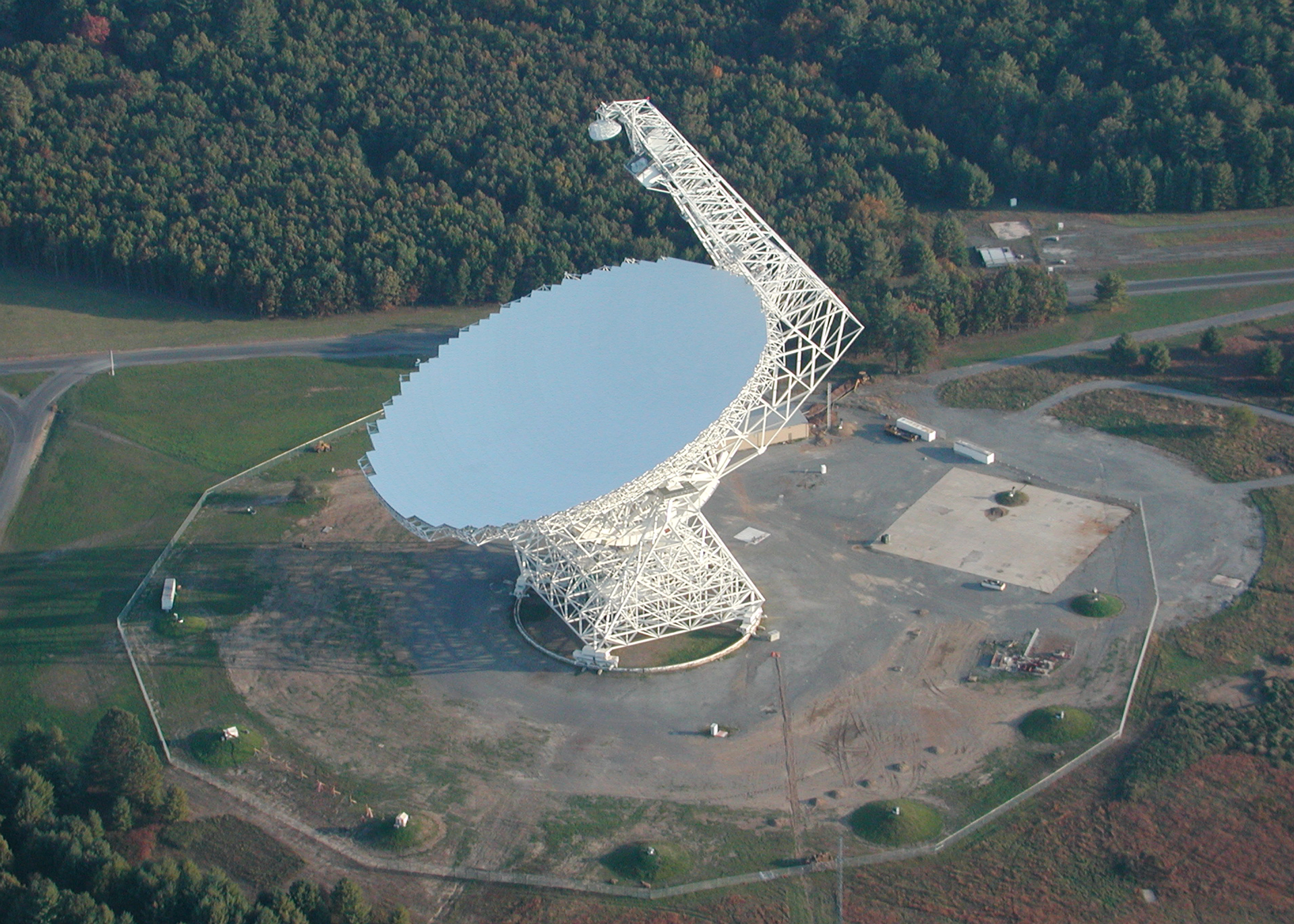A new study connects the black hole’s famous ring of light to a compact region that marks the likely base of the jet, bringing scientists closer to understanding how black holes power some of the brightest beacons in the universe.
Recent News
Magnetic Superhighways Discovered in a Starburst Galaxy’s Winds
Using the Atacama Large Millimeter/submillimeter Array (ALMA), an international team of astronomers has mapped a magnetic highway driving a powerful galactic wind into the nearby galaxy merger of Arp 220, revealing for the first time that its fast, molecular outflows are strongly magnetized and likely helping to drive metals, dust, and cosmic rays into the space around the galaxy.
Making Scientific Breakthroughs Possible in 2025
2025 was an incredibly productive year for AUI, marked by significant advances across astronomy, energy, advanced therapeutics, and STEM education and workforce development.
NSF Funds New Opportunity for Undergraduate Students

Green Bank Telescope. Credit: NRAO/AUI/NSF
Students to Research Impacts of New Astronomy Curriculum
AUI and the University of North Carolina Chapel Hill (UNC-Chapel Hill) are currently seeking undergraduate students to contribute to cutting-edge research in astronomy education. This paid opportunity, open to education and STEM majors, explores the impacts of new curriculum centered on the use of robotic telescopes, and is made possible through U.S. National Science Foundation funding. The program, consisting of approximately 360 primarily flexible workhours, runs from June 2024 through January 2025. This research experience is hybrid and features travel allowance for activities including an in-person field training at the Green Bank Observatory on June 9-15. Applications are due Sunday, May 5, 2024.
“Specifically, the research will focus on understanding how pedagogical methods and collaborative approaches impact student outcomes in astronomy education” said Dan Reichart, professor of physics and astronomy at the UNC-Chapel Hill and director of the Skynet Robotic Telescope Network. “What we are really looking for are students active in STEM or educational fields, with a strong academic record and interest in research. In turn, participants will have an opportunity to be mentored, work with an international team, travel to data collection sites and help present research findings at a professional conference.”
Travel will be funded through an allowance and the students will be supported with a $4,000 stipend.
“This is a wonderful introduction into education research,” said Tiffany Stone Wolbrecht, AUI’s interim director for education and public engagement. “The selected students will gain valuable experience in observational data analysis, research methods, collaborating on an international research team, and may even have the opportunity to publish outcomes beyond the program.”
The experience is part of a Research Experience for Undergraduate (REU) program and focuses on exploring STEM attitudes, self-efficacy and career intentions in introductory astronomy courses. The selected REU students will play a crucial role in investigating emerging trends in STEM education through a case study approach. They will collect observational and interview data, analyze existing survey data and collaborate with our research team to uncover insights into student learning experiences.
To apply, U.S. citizens and permanent residents that are currently enrolled in an undergraduate degree program should submit a current resume or CV, a statement of interest outlining their motivation for participating in the REU program and relevant experience (max 500 words), and preferably two letters of recommendation to Tiffany Stone Wolbrecht at [email protected].
We believe that diversity strengthens our research community and enriches the educational experience for everyone involved. We are committed to fostering an inclusive environment where all individuals, including women, people of color, LGBTQ+ individuals, individuals with disabilities, and first-generation college students feel welcome and valued. We actively encourage applications from students from these underrepresented groups.
Recent News
New Event Horizon Telescope Results Trace M87 Jet Back to Its Black Hole
A new study connects the black hole’s famous ring of light to a compact region that marks the likely base of the jet, bringing scientists closer to understanding how black holes power some of the brightest beacons in the universe.
Magnetic Superhighways Discovered in a Starburst Galaxy’s Winds
Using the Atacama Large Millimeter/submillimeter Array (ALMA), an international team of astronomers has mapped a magnetic highway driving a powerful galactic wind into the nearby galaxy merger of Arp 220, revealing for the first time that its fast, molecular outflows are strongly magnetized and likely helping to drive metals, dust, and cosmic rays into the space around the galaxy.
Making Scientific Breakthroughs Possible in 2025
2025 was an incredibly productive year for AUI, marked by significant advances across astronomy, energy, advanced therapeutics, and STEM education and workforce development.
